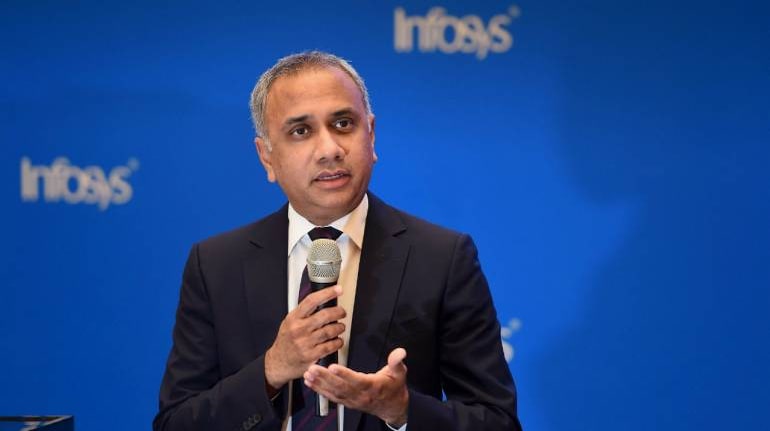



By approving a mega-compensation package for Salil Parekh, its CEO for the last four-and-a-half years, Infosys isn’t just rewarding his performance but also correcting a historical wrong. In 2017, Parekh was brought in after the messy exit of previous CEO Vishal Sikka. Through all the sparks that flew in the months leading up to the eventual transition, it was Sikka’s high salary that was the bone of contention.
The fact is, notwithstanding co-founder NR Narayana Murthy’s disagreements with Sikka over the issue, the company’s investors clearly were impressed with his performance, enough for its share price to rise 26 percent in the three years that he was at the helm. Nor was this part of a secular rise in IT stocks. During that period, Infosys was the outperformer in the stock market with shares of the other four Indian IT companies posting lower returns. While the markets aren’t the only index of a company’s worth, the surge at Infosys came on the back of robust and profit growth.
Yet Sikka ran afoul of Murthy’s ideologically-coloured views on executive compensation, and his Rs 49 crore package along with the large severance offered to ex-CFO Rajiv Bansal, invited censure even though a fully-empowered board had cleared both decisions. It wasn’t any one’s case that Sikka didn’t deserve his salary, but that high salaries are bad in themselves.
Once before Indian IT was rocked by a similar controversy when in 2005, Vivek Paul, then vice-chairman of Wipro, and a man earmarked to be the successor to chairman Azim Premji, quit amidst reports of differences on the compensation he expected, and what he was getting from an admittedly tight-fisted Premji. Paul’s exit led to a decade of disappointing performance at Wipro, and while there were other factors responsible too, leadership issues, as Wipro lurched from one model to another, were clearly paramount.
Infosys’ decision to hike Parekh’s salary by a whopping 88 percent seeks to erase such previous follies by linking the CEO’s compensation to the company’s performance and its stated targets, rather than some arbitrarily chosen number that may be socially acceptable.
Over the last couple of years, several Indian firms have been at the receiving end of investors’ ire after they tried to push through inflated compensation packages for their top brass at a time when the pandemic and in some cases their own limitations, impacted the companies’ performance adversely. As shareholders, including foreign institutions and mutual funds, struck down hikes for the CEO at companies like Hero MotoCorp, Bajaj Auto, Eicher Motors, and Balkrishna Industries, it was evident that executive compensation among Indian companies would henceforth have to pass the sniff test of pure performance.
Significantly, all of these companies are in the auto sector — one of the most badly hit by the pandemic with sales and profits taking a severe beating leading to job losses and salary cuts for employees. The opposition to a salary hike for already well-paid executives then, was justified both by the circumstances and the suffering of the rest of the workforce.
The IT services business, by contrast, has been going through an upturn with revenues and profits for the sector as a whole and the top firms in particular, soaring to multi-year highs. This has spelt a bonanza for all stakeholders with investors cashing in on a sharp rise in IT stocks while employees gained from rising demand for their services that has seen attrition sizzling at 25 percent even as companies have been hiking salaries and bonuses.
In this scenario, Infosys has posted outstanding results with its growth this year ahead of even market leader TCS. Its market cap after peaking at $110 billion in January is around $79 billion now, more than double what it was when Parekh took charge of a company that was in the limelight for all the wrong reasons.
Set against these numbers, his compensation is par for the course, particularly since a large part of it comes from restricted stock units (RSUs). Nor is he the only executive to reap the benefits of the company’s strong showing. The Nomination and Remuneration Committee (NRC) at Infosys simultaneously approved a grant of additional shares to other senior executives as well.
Stock options are the lifeblood of compensation plans for executives in robust and progressive companies. In a sense they are the leverage with which a company exercises influence over the strategic decisions that leaders make. These in turn lead to value addition for the shareholders. In a widely-held company like Infosys, it is best that the interests of top executives and shareholders coincide.
Sundeep Khanna is a senior journalist. Views are personal, and do not represent the stand of this publication.
Discover the latest Business News, Sensex, and Nifty updates. Obtain Personal Finance insights, tax queries, and expert opinions on Moneycontrol or download the Moneycontrol App to stay updated!
Find the best of Al News in one place, specially curated for you every weekend.
Stay on top of the latest tech trends and biggest startup news.